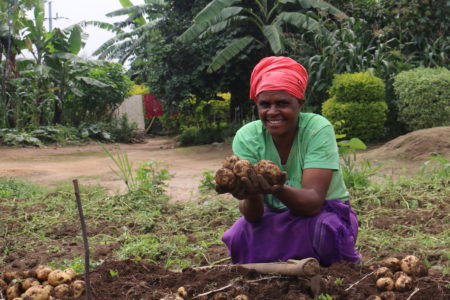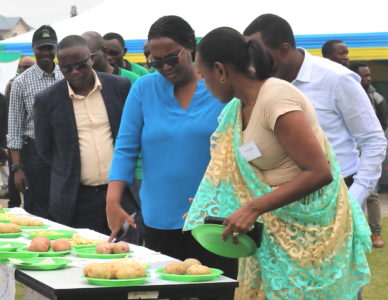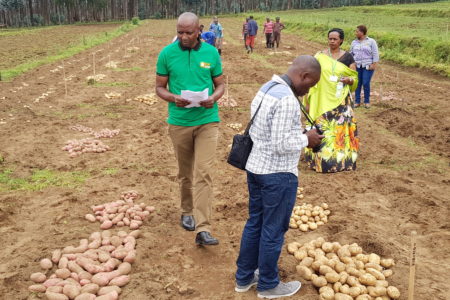
The potato is one of Rwanda’s most important crops, yet Rwandan farmers struggle to produce decent harvests, primarily because they grow low-yielding and disease-susceptible potato varieties. That will soon begin to change, as Rwandan authorities are preparing to release five new varieties with higher yield potential and greater resistance to late blight disease.
The new varieties will be the first released in Rwanda in almost 30 years. They are the product of a partnership between the International Potato Center (CIP) and the Rwanda Agricultural and Animal Resources Development Board (RAB), with collaboration from farmers, universities, cooperatives and food-processing companies. Together they evaluated 21 CIP-bred potatoes over the course of two years and recommended five for release as varieties. The initiative was supported by the United States Agency for International Development (USAID) through its Private Sector Driven Agricultural Growth project.
According to Placide Rukundo, research coordinator of the RAB potato sub-program, the 21 potato clones that CIP shared with RAB were grown for several seasons at 10 sites scattered across Rwanda, to test their disease resistance and adaptation to the country’s varied climates and soils. Farmers evaluated their agronomic, cooking and table qualities while processing companies tested their suitability for potato chip and crisp production. The best of them yielded between 30 and 40 tons per hectare, compared to Rwanda’s average yields of 10-15 tons per hectare.
In January, the top five tubers were unveiled at a variety-naming event at RAB’s Musanze Research Station, in northern Rwanda. The event brought together researchers, local leaders and farmers, who tasted the candidate varieties, boiled and as chips, and gave them names. The names of the new spuds are: Ndeze, Kaze Neza, Izihirwe, Nkunganire and Twihaze.

Rwanda’s Minister of Agriculture, Dr. Geraldine Mukeshimana, who spoke at the event, expressed her satisfaction that the country was finally going to release new potato varieties and urged stakeholders to contribute to their rapid multiplication and dissemination to the farmers who need them.
Nyirambanjinka Alphonsine, a farmer who hosted trials for two planting seasons, said she was convinced the new varieties would produce higher yields than the ones currently being grown. “I did not need a lot of inputs like fertilizer and the varieties were not affected by many diseases. Their big size also appeals to the market,” she said.
Kirimi Sindi, CIP-Rwanda Country Manager, noted that Alphonsine and other farmers who hosted field trials played a vital role in the evaluation and variety selection process. He thanked the Ministry of Agriculture, RAB and USAID for making the evaluation and release of new varieties possible.
Thiago Mendes, a CIP potato breeder for East Africa, noted that each of the candidate varieties has specific qualities that allow it to fill agronomic and market needs. For example, a heat tolerant variety will help expand potato production into lowlands areas, whereas early maturing Ndeze is perfect for the country’s short growing season. Some varieties are also ideal for the country’s fast-growing chip and crisp industry, which will contribute to a strong market for farmers.

Mendes added that in addition to facilitating the evaluation and selection of new varieties, the project introduced innovations into the country’s potato breeding program and seed systems. “This project was a game changer for the potato value chain in Rwanda,” he said. “It has increased the RAB potato breeding program’s value and expertise in variety development.”
Rukundo explained that RAB is producing early generation seed for the new varieties using technologies such as tissue culture and aeroponics – which produces minitubers in mist-fed chambers – so that large amounts of seed potatoes can be disseminated to farmers once the varieties are officially released later this year. He added that RAB and partners continue to evaluate other CIP-bred potato clones, some of which may be released as varieties in the coming years.
“Before, farmers had few varieties to choose from. With these new varieties, they will have a broader choice,” Rukundo said. “This project has made a big contribution to Rwanda’s potato sector.”
Blog by Donata Kiiza and Sindi Kirimi – CIP Rwanda. Editing by Vivian Atakos and David Dudenhoefer.
